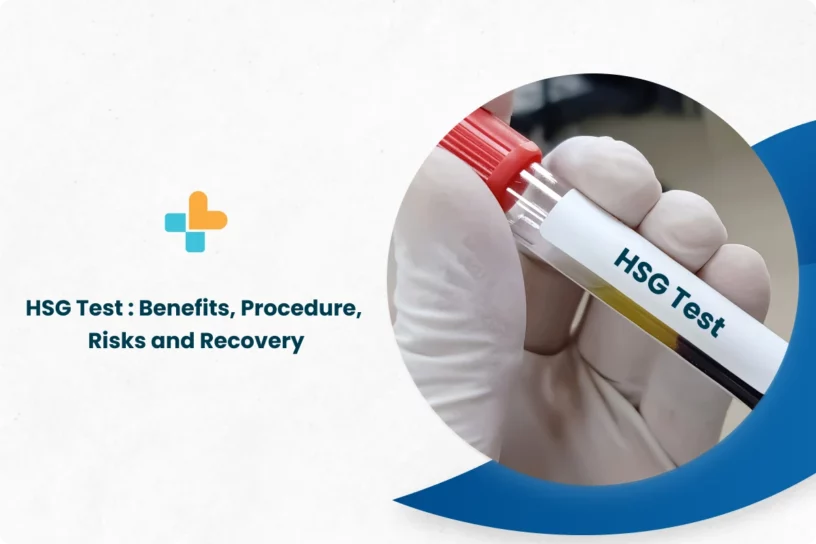Overview
Fertility issues are becoming common these days. Various factors like lifestyle, stress, diseases, medications, etc., may pose a problem while conceiving. Different organs in the body are also responsible for playing a vital role during pregnancy; some of these important organs include the ovaries, uterus, and fallopian tubes. To get pregnant, it is important to know that the body’s organs are in check.
In women experiencing problems getting pregnant or facing pregnancy issues like multiple miscarriages, the doctor may prescribe a hysterosalpingogram or HSG test to diagnose the problem that may be causing fertility issues.
This blog highlights everything you need to know about an HCG test (hysterosalpingogram). So, please keep reading.
What Is A Hysterosalpingogram?
An HSG (hysterosalpingogram) is a diagnostic X-ray procedure that uses a dye to examine issues related to the ability to conceive (fertility issues). In this test, a doctor examines the patient’s fallopian tubes and uterus to check for any blockage in the fallopian tubes or structural abnormalities in the uterus that may be preventing pregnancy.
When Is A Hysterosalpingogram Performed?
A hysterosalpingogram is typically performed during the initial phase of the menstrual cycle after the period has ended but before ovulation to minimise the possibility of being either pregnant or having a menstrual period during the test. The right time to perform this test is decided by the doctor.
When Would A Hysterosalpingogram Be Needed?
An HSG may be recommended by a doctor if a person is experiencing difficulty getting pregnant or has had previous issues with pregnancy, such as multiple miscarriages. The test can assist in identifying the underlying causes of infertility, which may include structural defects in the uterus, which can be inherited or acquired, blockages in the fallopian tubes, scarring in the uterus, uterine fibroids, or tumours or polyps in the uterus.
A hysterosalpingogram may be ordered by a doctor to verify the success of tubal surgery, such as tubal ligation (a procedure where the fallopian tubes are closed). This test can help in ensuring that fallopian tubes are properly closed after tubal ligation. Additionally, a hysterosalpingogram can also help in checking the reopening of the fallopian tubes by reversing whether tubal ligation was a success or not.
Benefits Of Hsg Test
There are various benefits of an HSG test, which include the following,
- It helps the doctor in checking for any blockages in the fallopian tube or any abnormalities in the uterus that may be causing a problem in conceiving.
- The procedure does not take a lot of time, and the patient can go home after it.
- The procedure is non-invasive.
How Do I Prepare For A Hsg Test?
To prepare for a hysterosalpingogram (HSG) procedure, follow your healthcare provider’s instructions. Before starting the HSG procedure, your healthcare provider may suggest taking pain medication an hour before the procedure. Your healthcare provider may also suggest you take antibiotics before or after the procedure to prevent any infection.
Additionally, it is a good idea to arrange for someone to accompany you home after the procedure, as you may experience cramping that may make driving difficult.
How Does The Procedure Work?
For the hysterosalpingogram (HSG) test, you will need to wear a hospital gown and position yourself on your back. Your knees are too bent and feet are to be kept apart, similar to a pelvic examination. The radiologist will then insert a speculum and use it to view the cervix, which is located at the back of the vagina; you may feel a little discomfort during this process. The radiologist will then clean your cervix and may use a local anaesthetic injection into the cervix to ease the discomfort.
After this, the radiologist will insert a cannula which is a thin tube, into the cervix and remove the speculum. Then, a contrast dye will be introduced through the cannula into the uterus and the fallopian tube.
The radiologist will then begin taking X-rays. During this point, you may have to change your position a couple of times to get images from different points. During the X-ray process, you may experience some cramping as the dye moves. Once the images are taken, the cannula will be removed, and you may be allowed to go home.
Important Note
- It is essential to inform your doctor if you may be pregnant or have a pelvic inflammatory disease (PID) or unexplained vaginal bleeding before undergoing an HSG test.
- Since this test uses a contrast dye, inform the doctor if you have a history of an allergic reaction to it.
- Remove any metal or jewellery you are wearing before undergoing the test.
What To Expect After The Test?
Once the test is done, you might be required to wear a pad or a tampon to prevent the dye solution from leaking. You may see a small amount of blood (vaginal bleeding) and a sticky discharge. Apart from this, you are likely to experience,
- Cramping
- Nausea
- Stomach upset
- Dizziness
Note: Contact your healthcare provider immediately upon experiencing any of the following symptoms, as they may be an indication of an infection,
- Chronic pain
- Severe cramping
- Heavy bleeding
- Vomiting
- A discharge with an unpleasant smell
- Fever and chills
- Fainting
What Are The Risks Of This Test?
Although the HSG test is a safe procedure, there are certain possible risks. These include the following,
- An allergic reaction to the dye used
- Infections in the uterus or fallopian tubes
- Uterus injury
Results And Follow-Up
Once the test is performed, your doctor will examine your results to diagnose the cause of fertility problems. Upon noticing any issue like a blockage, you may be advised to undergo a laparoscopy. Additionally, your results will also help your doctor plan your fertility treatment.
How Much Does An Hsg Test Cost In India?
The price of an HSG test may vary depending from hospital to hospital. In India, an HSG test may cost anywhere between INR 800- INR 5000.
Conclusion
Experiencing fertility issues can be scary. However, it is important not to panic and find the root cause of it. An HSG test helps in checking for any blockage in the fallopian tubes or structural abnormalities in the uterus that may be preventing pregnancy. In case of any fertility concerns, it is best to consult a doctor.
At Ayu Health, we provide the best diagnostic services at affordable prices. Our team of highly experienced and qualified doctors provides the best treatments for any fertility concern our patients have. We are highly patient-centric and believe in providing the utmost patient satisfaction.
FAQs
1. Is a hysterosalpingogram painful?
You may experience mild pain and slight discomfort during and after the HSG test. The dye used may cause cramps. However, your doctor may prescribe over-the-counter NSAIDs to relieve pain. It is important to inform your healthcare provider immediately upon experiencing severe cramps and pain.
2. How long does it take to recover from an HSG test?
You will recover quickly after the HSG test is done and can resume your everyday activities the next day. However, if you experience severe side effects or symptoms that may indicate an infection, contact your healthcare provider immediately.
Our Hospital Locations
Gynaecology Surgery Hospitals in Chandigarh | Gynaecology Surgery Hospitals in Bangalore | Gynaecology Surgery Hospitals in Jaipur | Gynaecology Surgery Hospitals in NCR | Gynaecology Surgery Hospitals in Hyderabad
Our Doctors
Gynaecology Surgery Doctors in Chandigarh | Gynaecology Surgery Doctors in Bangalore | Gynaecology Surgery Doctors in Jaipur | Gynaecology Surgery Doctors in NCR | Gynaecology Surgery Doctors in Hyderabad
About the Author

Dr. Nikitha Murthy B.S.
Dr. Nikitha Murthy B.S. is a renowned Gynaecologist currently practicing at Ayu Health, Bangalore.
He is s a Consultant with IVF Access at its Rajajinagar clinic. She has over 6 years of experience. Dr. Nikitha has a post-graduation (MS) in Gynaecology, DNB from the National Board of India, and a Fellowship in Reproductive Medicine. He also has vast experience in Post-Graduation (MS) in Gynaecology and DNB.




